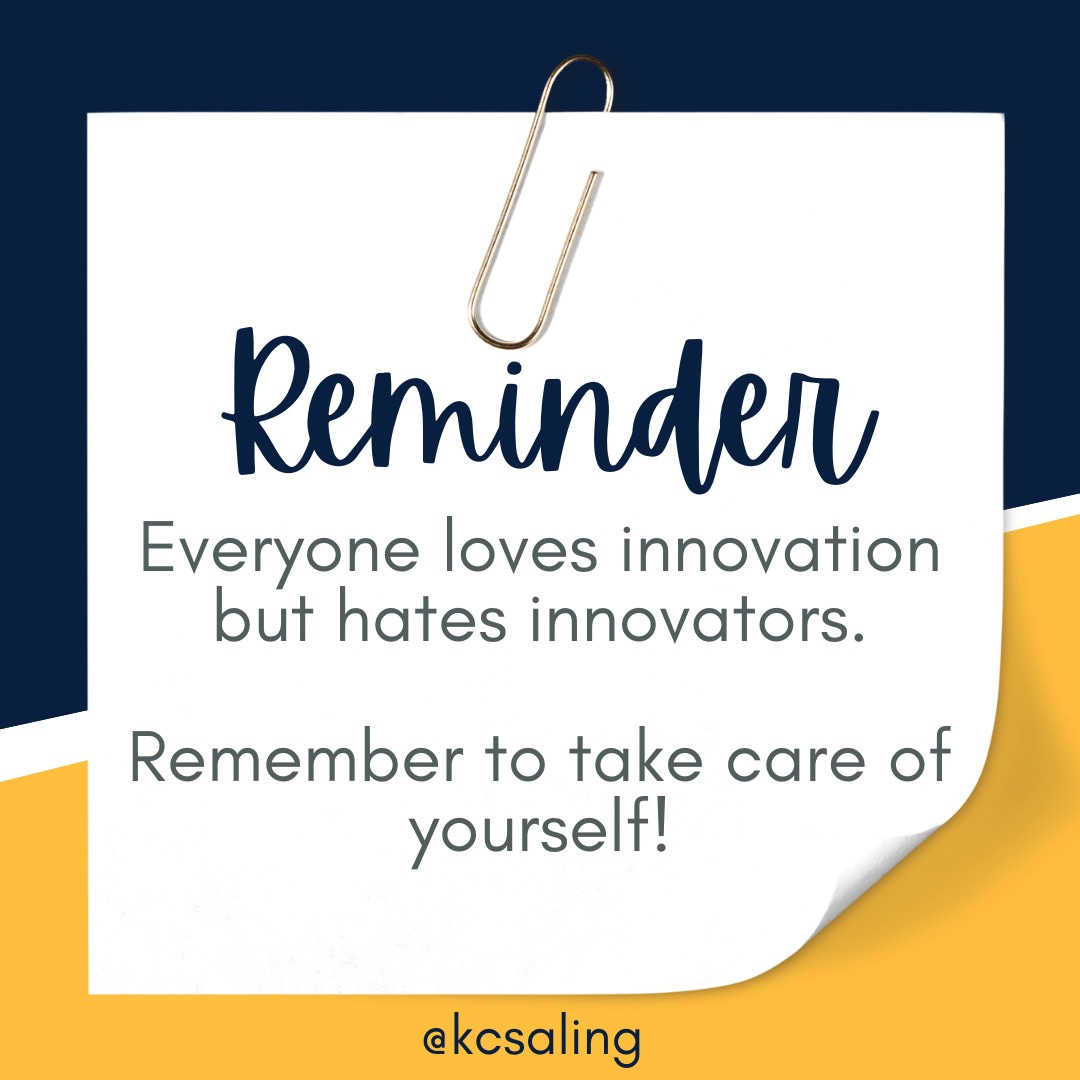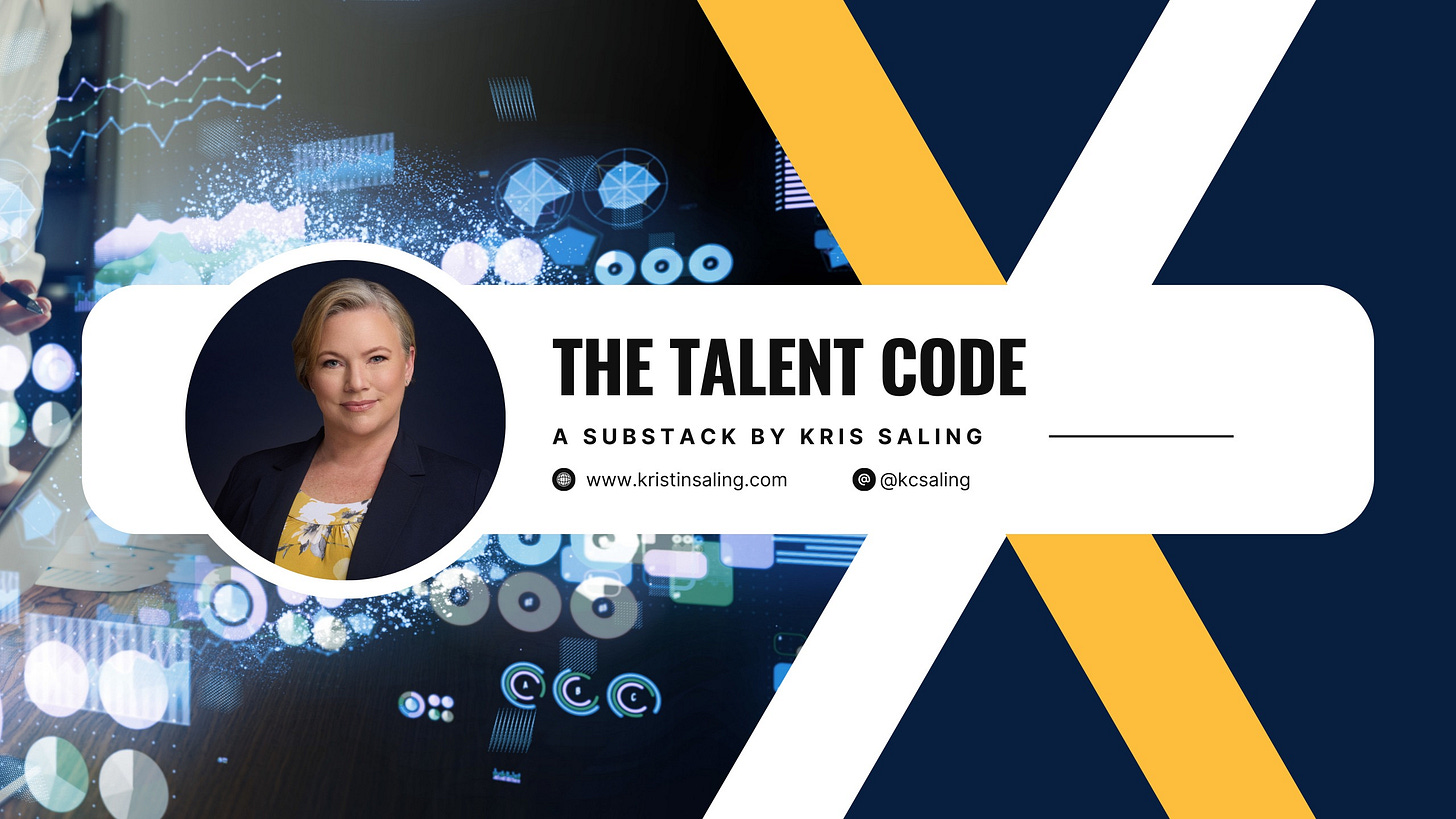Even The Good Stuff Wears You Out
Managing Stress While Leading Change
I’ll be honest—when a quick-turn trip to D.C. got canceled at the last minute, I felt an unexpected wave of relief. Not because I didn’t want to be there, but because the space it created gave me a moment to breathe, to spend a full week with my family—and to connect with a few fellow change agents who’ve also been living at the chaotic edge of transformation.
In those conversations, regardless of where we started, one theme kept surfacing: we’re all excited about the possibilities this moment of disruption is creating, but it’s still chaos. And in that chaos, we’ve all had to be “on” 100% of the time for months—navigating shifting priorities, leading, responding to resistance, staying positive for our teams, and managing nonstop demands. Even good stress is still stress.
This week’s Talent Code is a reflection on that tension. A reminder that sleep isn’t optional, that rest doesn’t always mean doing nothing, and that coping measures aren’t weakness—they’re strategic. If we want to keep showing up as bold, creative leaders, we have to build systems that help us recharge, protect our boundaries, and shoulder the load without burning out.
Let’s talk about what it looks like to lead through change—and still be human while we do it. 🚀
Even the Good Stuff Wears You Out
Managing Stress While Managing Change
The truth about leading change is this: it’s exciting, meaningful, and energizing—and it will absolutely wear you down if you’re not careful.
We don’t talk about this enough. We celebrate innovation. We admire transformation. We build momentum around phrases like “step into the arena,” “fail forward,” and “burn the boats.” But we rarely talk about the fact that even when things are going well—even when the work is aligned with your purpose and fueled by momentum—it can still be exhausting.
Recently, when a short-notice trip to D.C. got canceled, I was surprised by how relieved I felt. That cancellation opened up a little space to breathe, and in that space, I connected with a few other leaders who’ve also been living deep in the chaos of transformation. We talked about the opportunities ahead—the cracks in old systems that are finally opening up, the momentum that’s building, the permission to experiment and lead differently.
And we also admitted: we’re all tired. Everyone has been “on” for months. And no one is sure when the next real break is coming.
So this week, I want to pause and discuss a few big reminders for those who are driving change—especially in big systems, high-stakes organizations, or anywhere the work feels both exhilarating and relentless.
1. Good Stress Is Still Stress
We tend to label stress as something negative—something caused by toxic work environments, bad bosses, or impossible deadlines. But not all stress is bad. Some of it is the natural result of doing something hard, meaningful, and new. It’s what psychologists call eustress—the kind of pressure that sharpens focus and drives performance.
But here’s the catch: your nervous system doesn’t know the difference. Whether you’re stressed because you’re innovating or because you’re overloaded, your body still responds with cortisol, adrenaline, and tension. You still burn energy. You still hit a wall.
So even when the work is good—when it’s aligned with your values, when you’re making an impact—you have to treat recovery and stress management as non-negotiables. Because over time, unrelieved stress will catch up with you, no matter how purpose-driven you are.
2. Sleep Isn’t Optional
Let’s say it clearly: You cannot outwork a sleep deficit. You can’t caffeinate your way through it. You can’t offset it with “grit.” And no, you are not the exception. Maybe you don’t need a full eight hours, but there is some amount of non-zero sleep you need, full stop.
Sleep is the foundation of emotional regulation, cognitive performance, decision-making, and long-term health. When you’re sleep-deprived, your reaction times slow. Your creativity declines. You become more reactive and less empathetic. You miss context, misread signals, and overcorrect or under-respond.
In other words: the exact opposite of what you need when you’re leading through complexity.
So if you’re serious about your leadership, about your impact, about making sound decisions in chaotic environments—you need to protect your sleep like it’s a strategic asset. Because it is.
3. Rest Doesn’t Require Doing Nothing
One of the myths we carry is that rest means stopping completely—going off grid, checking out, taking a nap, sitting in silence.
But rest isn’t about absence—it’s about renewal. And that looks different for everyone.
For some people, it might be a quiet walk without your phone. For others, it’s reading a novel, calling a friend, taking a boxing class, or cooking a meal that has nothing to do with work (🙋🏼♀️). Rest can be active or passive—but it needs to replenish your energy, not deplete it further.
The key is to be intentional. Know what fills your tank, and build it into your rhythm. Not just on weekends. Not just on vacation. But in your week, your month, your calendar. Rest is a strategic input—not a reward for hitting a wall.
4. You Need Systems to Shoulder the Workload
If you’re constantly sprinting to keep up, you don’t need more willpower—you need a better system.
When you’re leading change, the demands come fast and uneven. One week it’s strategy. The next it’s communication. Then policy, partnerships, feedback, hiring, tech, performance, politics, and fire drills.
You can’t carry it all in your head. You can’t solve it all yourself. And you shouldn’t have to.
That’s why systems matter. You need:
Systems for decision-making (so you’re not reacting to every new crisis)
Systems for communication (so you’re not reinventing every message)
Systems for delegation (so others can carry the work forward)
Systems for feedback (so you’re not always the bottleneck)
And if you’re leading a team, build shared systems so the team doesn’t depend on you being “on” 100% of the time to function.
Hell, I even build systems at home, like where the dirty laundry goes in the laundry room, where we hang the car keys so we always know where they are, and shared calendars and spreadsheets so we know where everyone is supposed to be.
Sustainable change leadership requires you to lead like a system designer, not just an operator.
5. The New Stuff Can Be Just As Exhausting
Sometimes we think that switching gears, starting new projects, or moving into the next opportunity will fix our burnout.
Spoiler: it doesn’t always work like that.
The new stuff often comes with its own weight: new expectations, new relationships, new ambiguity, and a new performance standard that can be just as draining as the old stressors. Excitement and exhaustion often coexist.
So when you find yourself stepping into a new phase, build recovery into the transition. Reflect. Debrief. Set new boundaries. Reset your expectations. Don’t just run harder. Run smarter.
6. Boundaries Are a Leadership Skill
You can’t be a clear, calm, strategic leader if your days are packed edge to edge, your nights are consumed by email, and your weekends are filled with anxiety.
Boundaries are not barriers to excellence. They are the infrastructure of sustainability.
When you say no to the wrong things, you say yes to the right ones. When you protect your time, you protect your thinking. When you model healthy limits, your team learns they can too.
Start with one small shift. Block thinking time. Protect one night a week. Say no to a meeting that doesn’t need you. And then keep going.
Final Thought: You’re Allowed to Be Tired
Leading through change is hard—even when it’s good. Especially when it’s good.
You’re allowed to be tired. You’re allowed to rest. You’re allowed to protect your energy, delegate responsibility, and step back when you need to.
Because if you want to lead long enough to see the change you’re building…
You need to last.
Take care of your people.
But take care of yourself, too.
That’s the leadership we need most right now.
I’d love to leave you with some more final thoughts and links, but we’re going to be a little abbreviated this week. As someone who‘s a little cognitively saturated right now, I forgot my laptop when packing for this week’s trip, so you’re getting this issue of The Talent Code dictated and edited to Google Docs and then pasted into Substack on my phone. 😆
There’s always a solution—when you fly 2-3 times a week 2-3 weeks a month, everything goes wrong and you figure it out. I flew to Chicago for a week once with just my ID and not my wallet. Thank god for Apple Pay.
In the meantime, I hope everyone has a terrific week, that your stress is mostly good stress, and that you give yourself the latitude you need to manage it. Your team needs you.





